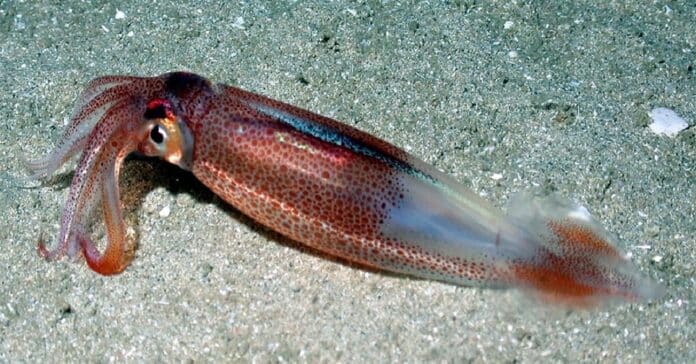The huge family of aquatic creatures known as cephalopods includes squid, cuttlefish, and octopuses. The epigenetic process of RNA editing can change the amino acid sequence of proteins. Most transcripts in cephalopods are recorded, which is thought to be an adaptive strategy that results in phenotypic plasticity.
In a new study, two researchers from the University of California, San Diego, discovered that some cephalopods have the capacity to “on the fly” recode protein motors in cells to adapt to various water temperatures.
The investigation focused on a pair of proteins in squid cells that act as molecular motors and move a range of intracellular payloads down cellular routes called microtubules.
RNA recoding allows organisms to modify genetic information from the genomic blueprint to produce new proteins. The technique is uncommon in humans but widespread in soft-bodied cephalopods like D. opalescent, which performs seasonal spawning trips along the San Diego coast.
Rangan said, “Cephalopods like D. opalescent are remarkable for their large nervous systems, body innovations, and complex behaviors, and their extensive use of RNA recoding has raised many questions about how this process might be involved in responding to environmental cues like temperature.”
Rangan and Reck-Peterson examined alterations in a pair of proteins in squid cells that function as molecular motors moving a range of intracellular payloads along cellular highways known as microtubules.
The researchers focused on molecular motor proteins called kinesin and dynein, essential for transportation within all cells, including neurons.
Mutations in both motors have been associated with neurodegenerative disorders in humans.
Rangan discovered that the recoding of kinesin increased in animals exposed to cooler ocean water temps while working with live squid hatchlings at Scripps Institution of Oceanography.
Rangan then used recombinant DNA technology and biochemistry to generate recoded kinesin proteins.
She then used advanced light microscopy to examine the movement of single motor molecules. She discovered that the recoded kinesin motors performed better at cold temperatures.
Reck-Peterson, said, “The work suggests that squid can tune their proteome (an organism’s entire complement of proteins) on the fly in response to changes in ocean temperature. One can speculate that this allows these marine ectotherms animals that depend on external sources of body heat to survive and thrive in a broad range of ocean temperatures.”
The researchers also discovered that RNA recoding differed among tissues, resulting in new kinesin variants with diverse movement capabilities.
Reck-Peterson, said, “This work supports the idea that recoding in cephalopods is important for dynamically tuning protein function to support physiological needs and acclimate to changing environmental conditions; these animals are taking a unique approach to adapt to their surroundings.”
The findings also suggest that the squid “epitome” could be useful for identifying areas of molecules amenable to plasticity or change. She is working on a database that includes the complete squid epitome at various water temperatures.
The researcher said, “In highly conserved proteins, like kinesin and dynein, cephalopod recoding sites can point to overlooked residues of functional significance, and this has broader implications for understanding basic protein function and for engineering proteins with specific functions. Cephalopods may be able to show us where to look and what changes to make.”
This research was funded by the Howard Hughes Medical Institute, the National Institutes of Health (NIGMS), and the Life Sciences Research Foundation.
Journal Reference:
- Kavita J. Rangan, Samara L. Reck-Peterson, etal. RNA recoding in cephalopods tailors microtubule motor protein function. Cell. DOI:10.1016/j.cell.2023.04.032
